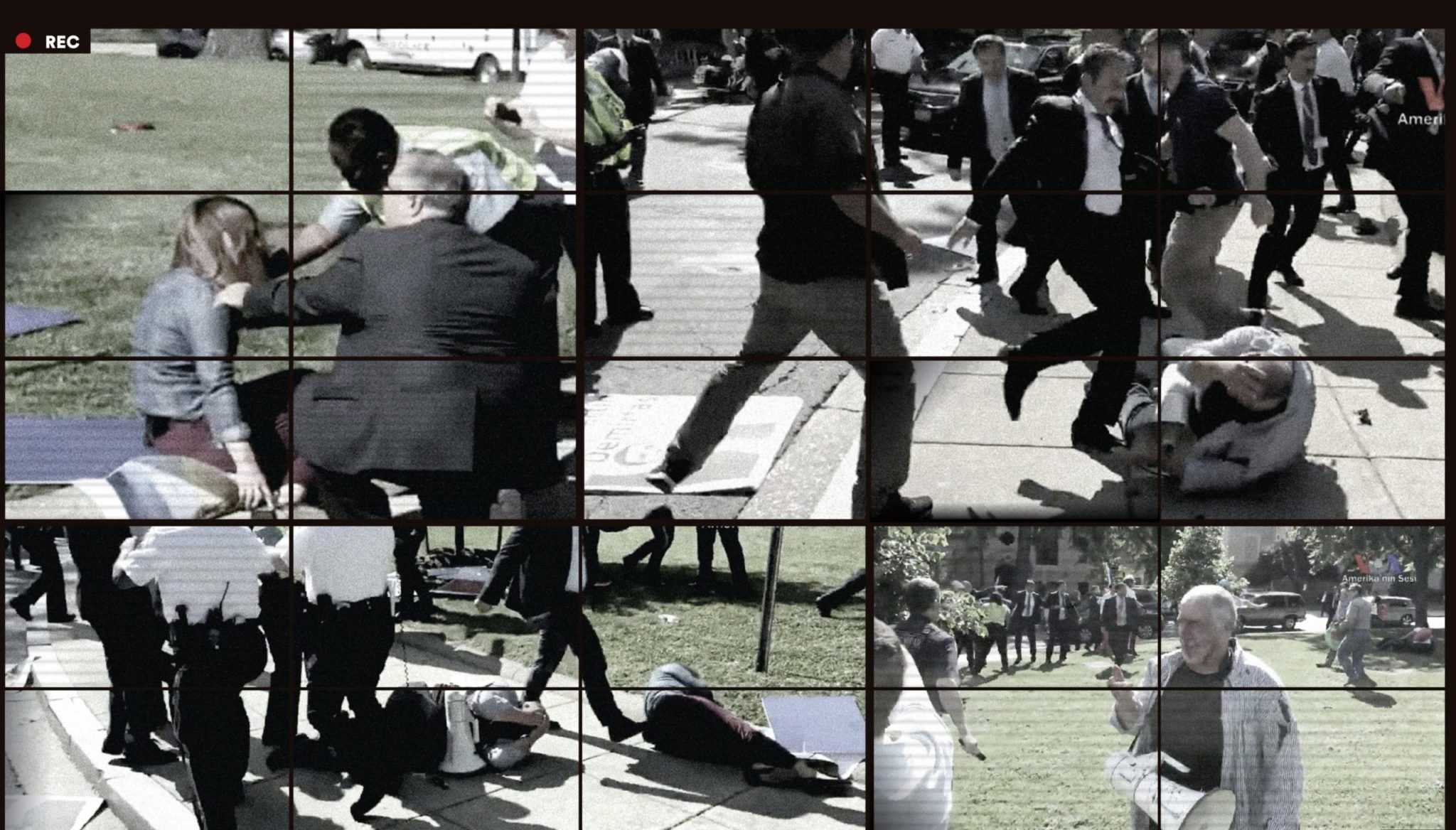Lucy Usoyan sensed danger. It was the afternoon of May 16, 2017, and Usoyan was among the Kurdish protesters outside the residence of Turkey’s ambassador to the United States. They were there to demonstrate against Turkey’s leader, Recep Tayyip Erdogan, who was in town for his first meeting with President Donald Trump in the US.
“Kurdish bitch!” Usoyan heard as the demonstrators crossed Massachusetts Avenue. In front of the residence, a large group of men had gathered. “Die, Kurds!” they shouted. “Kill the terrorists!”
Usoyan, 35, is an Alexandria resident and US citizen. But she’s ethnically Kurdish, which makes her a blood enemy in the eyes of some Turkish ultranationalists. Watching the men gathered outside the ambassador’s Sheridan Circle home, she noticed that the police on the scene seemed outnumbered.
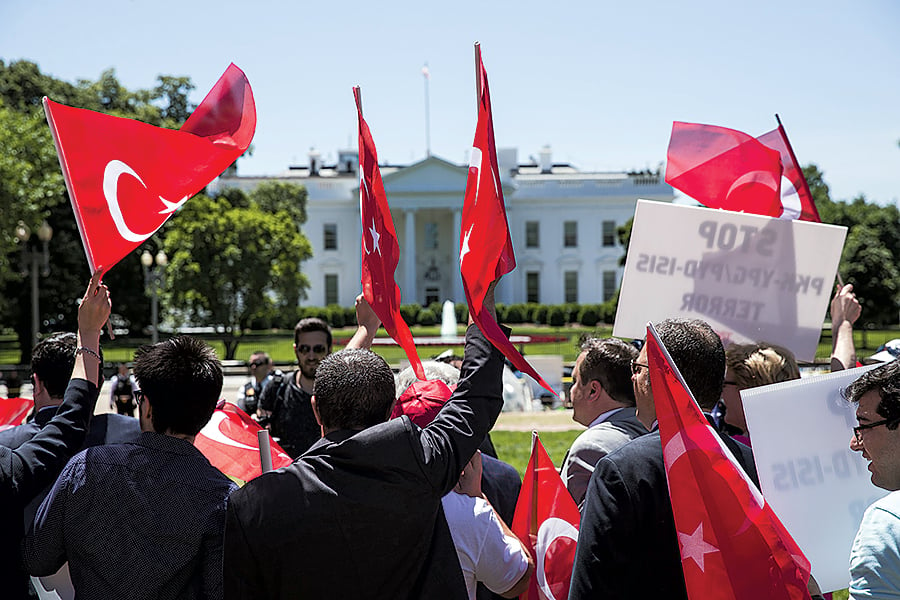
This doesn’t seem right to me, she recalls thinking. Look how many of them there are. This worries me.
Across Turkey, Erdogan’s regime had squelched dissent by beating up demonstrators and jailing dissidents. It also had a reputation for undiplomatic behavior abroad. Turkish guards had broken the nose of an Ecuadorian lawmaker and scuffled with employees and protesters at the Brookings Institution in 2016. But this was the capital of American democracy, where citizens like Lucy Usoyan believe they have the right to speak without fear.
Usoyan turned to Murat Yasa, one of the leaders of the Kurdish protest. Yasa, 61, a naturalized US citizen who runs a Northern Virginia carpet-and-flooring company, is a veteran protester who had brought his own bullhorn to the rally. He tried to remain calm, but the tension escalated. A few men began pushing past police who were trying to keep the two groups apart. A water bottle flew and slammed into Usoyan’s leg. She looked back at the other Kurds in the circle, who included a mother with her child in a stroller. Seconds later, Usoyan was thrown to the ground. There was no time to escape.
The next thing she knew, Usyoan woke up on the ground and told a DC police officer, “I cannot feel my legs.”
It had lasted no more than five minutes. By the end, nine protesters were hospitalized. A police officer and a Secret Service agent sustained injuries. The protesters suffered busted lips, concussions, and, in Lucy Usoyan’s case, a traumatic brain injury from which she has yet to recover.
Caught on video, the melee shocked onlookers and sparked outrage from city officials, commentators, and members of Congress. Coming just a few months into Trump’s presidency, the brawl had potent symbolism: An autocratic foreign leader—of a NATO ally, no less—had allowed his bodyguards to assault US citizens on the streets of the nation’s capital, and no one seemed accountable. At a news conference on June 14, DC police chief Peter Newsham said that “rarely have I seen in my 28 years of policing the type of thing I saw in Sheridan Circle.” The House of Representatives approved a resolution, 397–0, calling “for perpetrators to be brought to justice and measures to be taken to prevent similar incidents in the future.”
One year later, only two people charged in the Sheridan Circle assaults—the ones who happened to be without a ticket back to Turkey—have been arrested.
One year later, that hasn’t really happened. Though last July federal prosecutors charged 15 members of Erdogan’s security detail for allegedly participating in the brawl, the Turkish government refused to arrest them and mocked the charges. Prosecutors have dropped charges against 11 of the men. Only two people charged in the assaults—the ones who happened to be without a ticket out of the country—have been arrested.
For DC’s police, punishing the perpetrators of the Sheridan Circle confrontation would ordinarily have been straightforward. But because it’s tricky to prosecute representatives of foreign governments for actions committed on American soil, justice has proved elusive. Which explains why the case has given rise to a new civil action led by an unlikely band of Washington-area activists and attorneys, determined that Turkey pay for the brutality visited on unarmed Americans in the heart of DC.
The violence on Sheridan circle didn’t happen in a vacuum. Well before arriving at the ambassador’s residence that afternoon, Erdogan had raised with President Trump the case of a dissident Turkish cleric whom Turkey wants extradited back home from Pennsylvania. The men also sparred over US support for Kurdish-led militia in Syria, whom Erdogan considers terrorists. “Erdogan got nothing he was expecting from Trump,” says Steven Cook, a Middle East expert at the Council on Foreign Relations. “He left very frustrated.”
The day had also been marked by boisterous protests, both for and against the controversial Turkish leader. While Erdogan met with Trump, some of his supporters staged a rally in Lafayette Square. A sizable security presence—including Secret Service, Park Police, DC cops, and SWAT teams—prevented the group from getting near a rival gathering of Erdogan’s opponents, including Lucy Usoyan.
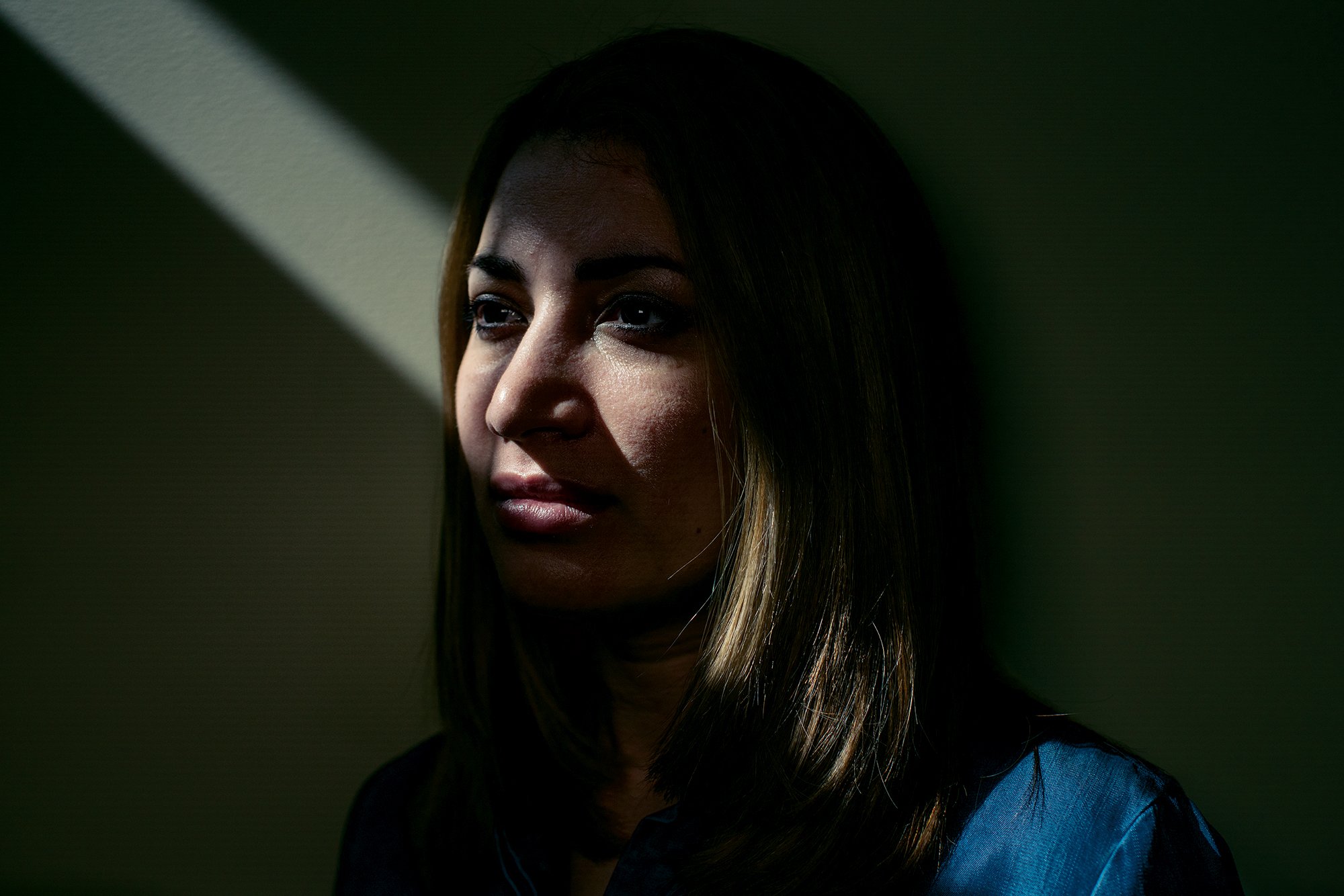
A native of Armenia, Usoyan is an Ezidi, a member of a tiny Kurdish sect with roots in ancient Mesopotamia. She became a US citizen in 2015, settling in DC and founding a nonprofit to help Ezidis displaced by fighting in northern Syria. Outside the White House, she voiced her anger at Erdogan’s government for its brutality toward Kurds. Among other things, she blamed Erdogan for encouraging a war in nearby Azerbaijan, where the fighting had caused her cousin’s beheading. “Erdogan is the terrorist!” she shouted.
The dueling protests in Lafayette Square ended without major incident, like so many rallies in a city that regularly hosts such confrontations. Usoyan considered meeting friends for lunch but decided to join the other Kurds and protest Erdogan’s visit to the Turkish ambassador’s residence at Sheridan Circle, a ten-minute walk away.
By now, the numbers had changed. There were fewer protesters than had been in Lafayette Square—perhaps 15—and far fewer police. One of the protesters was Heewa Arya, who had brought his seven-year-old daughter, Cheyenne. He and his wife are Kurdish refugees, originally from Iran. Every year, his wife’s family marks the anniversary of their US citizenship by calling them and saying, “Welcome to freedom.” Another parent in Sheridan Circle was Ruken Isik, a Kurdish-American who had come with her four-year-old son.
The confrontations were growing violent. A few Turkish supporters of Erdogan rushed across the street and confronted the protesters. One of Erdogan’s supporters was struck in the head, causing blood to stream down his face. Police officers intervened as people on both sides kicked and threw punches. Turkey’s ambassador to the US, Serdar Kilic, came out and demanded that the few DC police on hand remove the protesters. “I am the ambassador,” he said, according to video footage and victim-impact statements. “You cannot touch us.”
Lucy Usoyan covered her head. Her last thought was a question: Why are they kicking me? Then she blacked out.
A District police officer said the demonstrators had “a right to talk.”
A Turkish security officer shot back: “You need to take them—if you don’t, I will.”
Minutes later, Erdogan’s black Mercedes rounded the circle and pulled up the half-moon driveway to the ambassador’s residence. That put him about 100 yards from the protesters, next to a stone portico, safely protected by a phalanx of armed guards. The limousine door opened, but the president didn’t get out. Across the street, Murat Yasa bellowed into his megaphone: “Baby killer Erdogan!”
The head of Erdogan’s security guards leaned down toward the open door and spoke with the president. The guard stood up and motioned to two other agents who turned to face him. Using hand signals and an earpiece, he gave an order. One nodded and disappeared down the driveway toward a gathering of Turkish security agents.
Suddenly, men in black suits rushed across the street and slammed into the protesters. Supporters of Erdogan in plainclothes, many wearing military boots, joined the attack, punching and kicking the demonstrators. Lucy Usoyan and Murat Yasa were thrown to the ground.
Under US law and diplomatic practice, federal and local law-enforcement agencies are supposed to protect foreign diplomats and visiting heads of state. The Secret Service and State Department take the lead in preparing for diplomatic events, with DC’s Metropolitan Police Department providing backup.
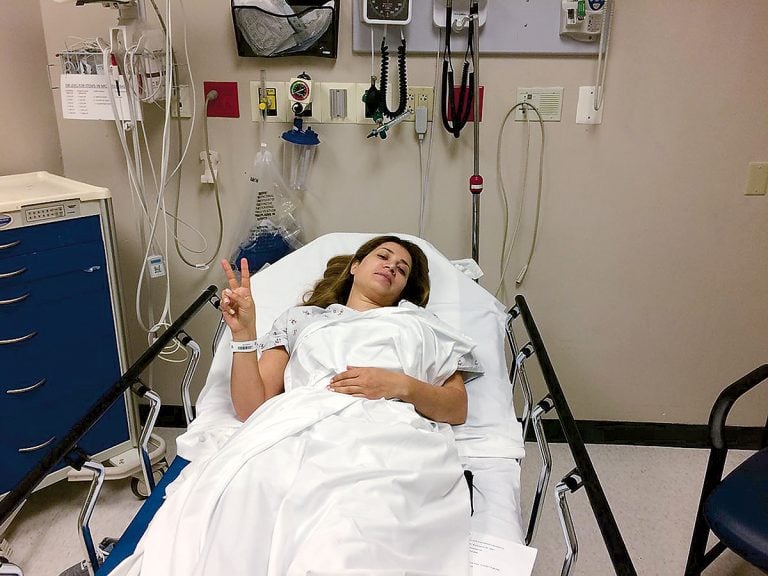 The brawl in Sheridan Circle left nine people hospitalized, including Usoyan. Photograph courtesy of Lucy Usoyan.
The brawl in Sheridan Circle left nine people hospitalized, including Usoyan. Photograph courtesy of Lucy Usoyan.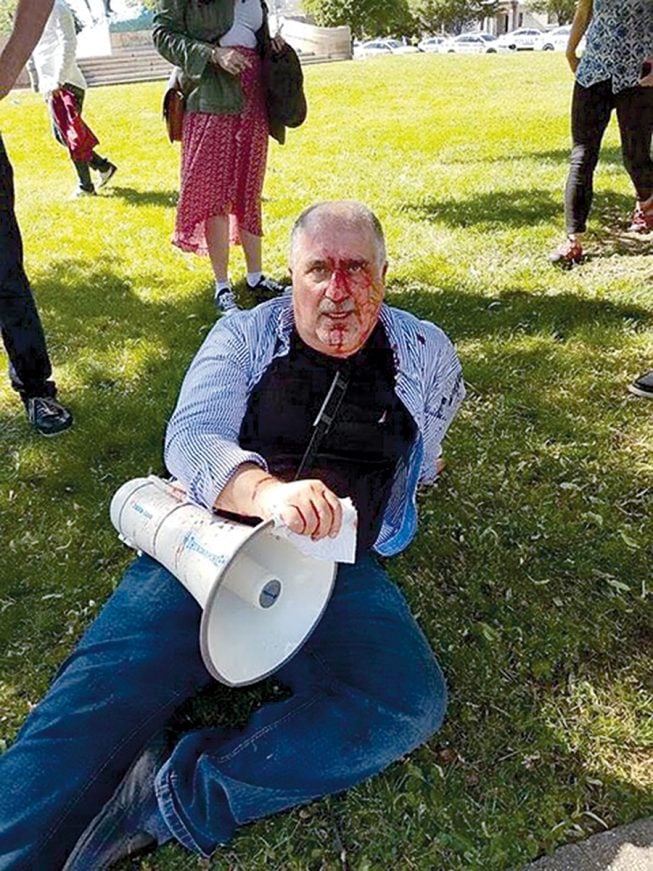 Murat Yasa, a 61-year-old Kurdish-American, was also hospitalized. Photograph courtesy of Murat Yasa.
Murat Yasa, a 61-year-old Kurdish-American, was also hospitalized. Photograph courtesy of Murat Yasa.As the violence unfolded, police on the scene unsuccessfully tried to restrain two Erdogan supporters who weren’t part of his official detail: Sinan Narin, a limo driver from McLean, and Eyup Yildirim, a burly contractor who had come from New Jersey to support the president. The men rushed past the police and started kicking Usoyan. She covered her face. Her last thought was a question: Why are they kicking me? Then she blacked out.
Yasa tried to use his body to cover Usoyan, but Yildirim pushed him back to the ground. He tried to get up, but his legs buckled. On the ground again, he tasted blood from his busted lip. He kept feeling the kicks to his forehead.This is it, he thought. They’re going to kill you. You won’t see your wife and children again.
Heewa Arya had taken his daughter, Cheyenne, from his shoulders and placed her on the ground before he was attacked. She ran past a fallen stroller to friends who had made their way to safety across the street, opposite the melee.
He felt kicks on his head and a voice saying, “Die, f—ing Kurd.”
President Erdogan, his face a mask, calmly emerged from his Mercedes, gave the confrontation a glance, turned, and walked into the residence.
The police arrested and released two men that afternoon. But in the days that followed, investigators began to assemble a bigger picture. Surveillance cameras had recorded the shouting, cursing, pushing, and kicking. A videographer from Voice of America had recorded the running brawls from many angles. Working with that footage and evidence pulled from mobile-phone videos, police matched images of those involved with entry-visa and passport photos of members of Erdogan’s entourage.
Ten days after the attacks, the New York Times published an extensive multimedia narrative of the attacks. Producers zeroed in on individual Turkish agents, some wearing gun holsters and security pins, highlighted them kicking and punching demonstrators, ran their quotes, and identified them by name.
On June 14, DC police chief Newsham issued arrest warrants for a dozen Turkish security guards and vowed they’d be arrested if they returned to the US. But the two men who had stomped Usoyan and Yasa were American citizens and in range. Police arrested Yildirim in New Jersey and took Narin into custody in Northern Virginia.
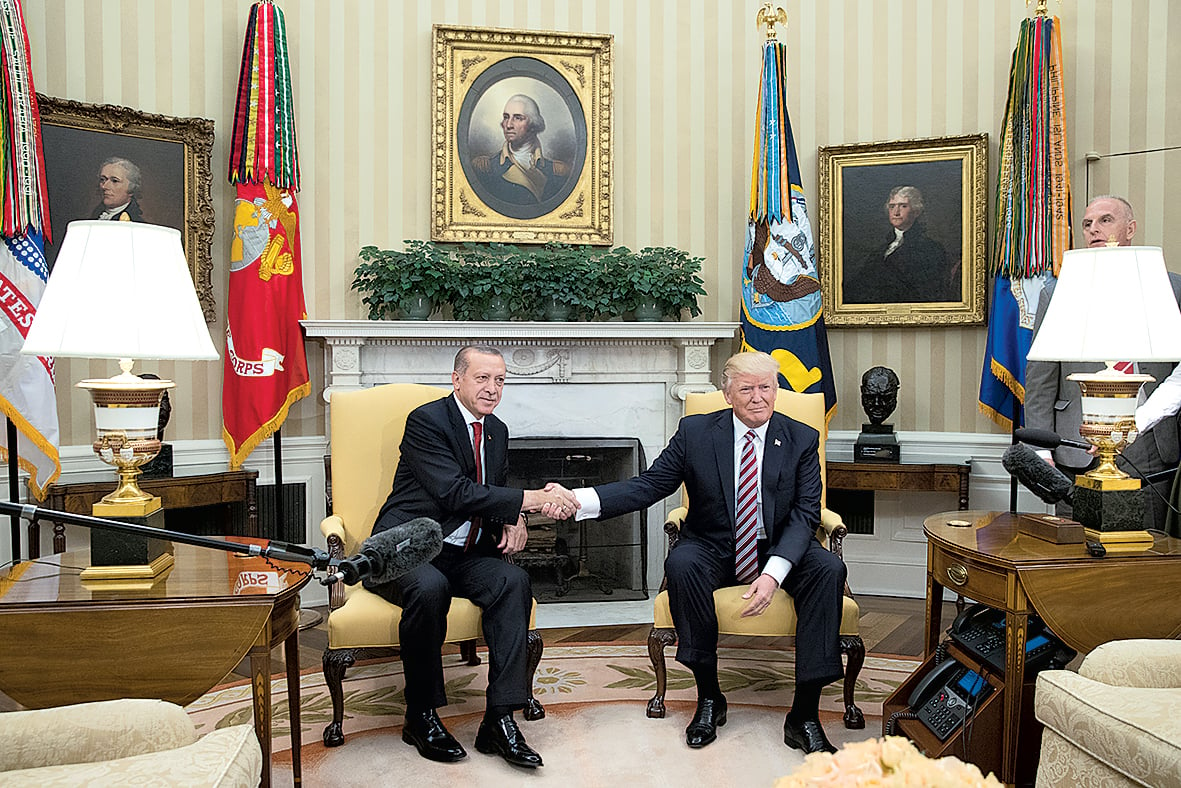
On July 17, building on the police department’s arrest warrants, a federal grand jury returned indictments against 19 men on 21 charges, including aggravated assault and hate crimes. Most were Turkish security agents who had returned to Ankara and were beyond reach. The Turkish government continued to call the protesters “supporters of terror” and claimed that Erdogan’s security had entered the fracas only because “police did not heed to Turkish demands to intervene.”
Erdogan mocked the US legal action.
“If my bodyguards cannot protect me, then why am I bringing them with me to the US?” he said at a press conference in Ankara in June. In fact, he was using the police department’s investigation to whip up enthusiasm back home, deflecting attention from his failure to exact concessions from Trump by insisting that he faced imminent danger on the streets of DC.
“That’s what took over the news cycle in Turkey,” Steven Cook says. “The [alleged] incompetence by US police in failing to protect Erdogan played well for him.”
Erdogan’s problems weren’t over, however. With the US government unable or unwilling to obtain justice for the Sheridan Circle victims, a group of DC lawyers set out to do so themselves.
Douglas Bregman had little inkling of the riot, let alone what had provoked it. But what he saw on the news that night horrified him: “This guy gets to come to our country, speak to the President at the White House, then send his thugs to bloody up American citizens just for speaking out?”
Bregman, 68, runs a civil-practice law firm in Bethesda. Originally from suburban Philadelphia, he got a law degree from Georgetown University in the 1970s and put down roots. He lectures there and at Columbia University law school. Having participated in protests during the 1960s, he sees a need to defend freedom of speech from threats “like abuse of power,” he says.
Under international law, foreign diplomats, heads of state, and even some security guards enjoy immunity from arrest and criminal prosecution in other countries. Bregman phoned one of his associates, Andreas Akaras, a litigator at Bregman, Berbert, Schwartz and Gilday. “Did you see what happened today at Sheridan Circle?” he asked.
“I’m watching it right now,” Akaras said. “Unbelievable.”
Akaras had joined Bregman’s firm after seven years as an aide to Maryland congressman John Sarbanes. He’d worked on a range of issues related to southeastern Europe and the Mediterranean and developed contacts in Turkey, Greece, Cyprus, and Israel. Bregman asked him to investigate whether any legal restitution was available to the victims.
“Let me see what’s going on up on the Hill and around town,” Akaras said.
In the aftermath of the attack, Lucy Usoyan had been taken to GW Hospital. She went home but collapsed the next morning. A CT scan revealed she’d suffered traumatic brain injury. For the next six weeks, she could barely leave her darkened room. Bright lights pierced her head and caused intense headaches. Same with loud noises. She struggled to take care of herself.
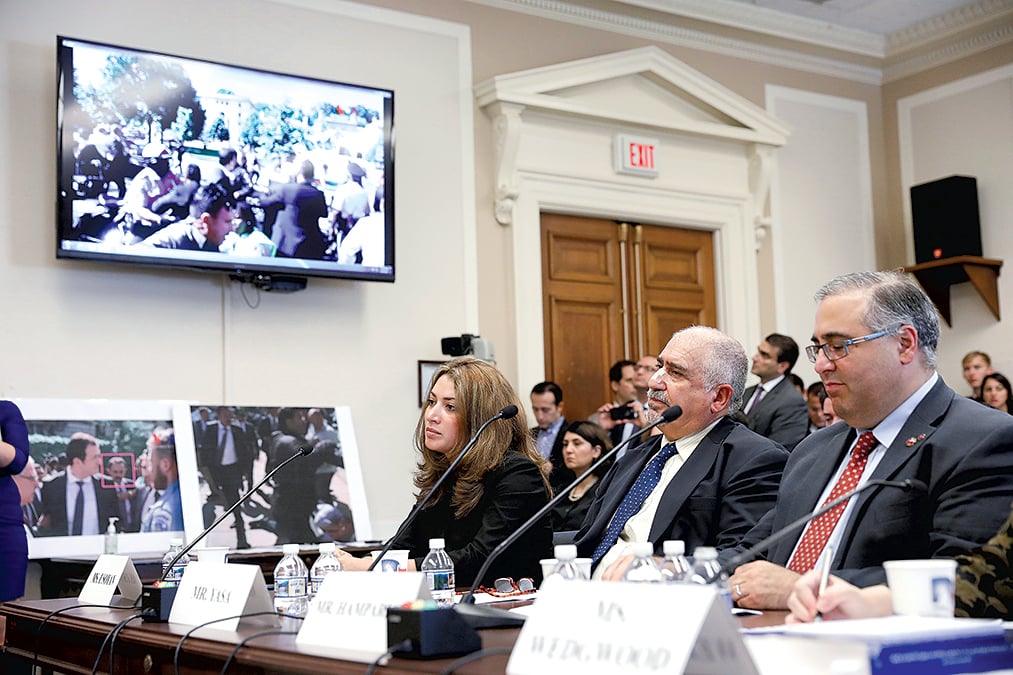
On May 25, Usoyan gathered herself together to testify before a House Foreign Affairs subcommittee. She sat at the witness table and described being kicked in the head. “When I opened my eyes, I think it was over,” she said. “I tried to get up, but my legs were very heavy. I don’t know why.”
Murat Yasa testified by Usoyan’s side. On the night of the brawl, he had driven himself home after getting stitches to close lacerations on his forehead. The next morning, his wife and children saw their father on CNN sitting in Sheridan Circle with a bloody face. He gathered the kids in a hug at the breakfast table and urged them to go to school. They couldn’t.
“How could a brutal attack such as this happen on American soil?” he asked. “How can I explain to my children that the country we love, and the country we call home, is the place where I was stripped of my rights?”
At the hearing, Usoyan offered up her greatest concern. She said she would confront Erdogan again, “but I am just afraid that if we let this go unnoticed or unfollowed, they will just kill us next time.”
After the hearing, Andreas Akaras met with Usoyan. They discussed grounds to bring a civil suit against Turkey under certain provisions of the Foreign Sovereign Immunities Act; he told her she might well have a case. “I am interested,” Usoyan answered. “I am certainly willing to discuss it.”
Akaras phoned Bregman. “Let’s do this thing,” he said.
Days after meeting Lucy Usoyan, Doug Bregman placed a call to a fellow longtime DC attorney named Steve Perles. To Bregman, the limited reach of the US criminal-justice system suggested the need for a different approach.
“I have this case that will rely on the Foreign Sovereign Immunities Act,” Bregman said. “You’re the guy who can do it.”
Lanky and press-averse, Perles had made his name forcing countries like Germany to pay historic war reparations and Iran and Libya to pay damages for terrorist acts, such as downing airplanes. “I do a lot of negotiations with really bad people,” he says in his office on Connecticut Avenue. “They want to know that the details are not going to show up on the front page of the New York Times.”
During the 1979 Iran hostage crisis, Perles served as an aide to Alaska Republican senator Ted Stevens, who received briefings on negotiations to free the hostages, including the Algiers Accords. A little-known aspect of the deal prohibited hostages from suing Iran for damages.
That irked Perles. Since then, he has tried to figure out ways for American citizens to legally sue foreign governments for sponsoring terrorism—or, as in the Sheridan Circle incident, for hurting US citizens and using immunity as a shield.
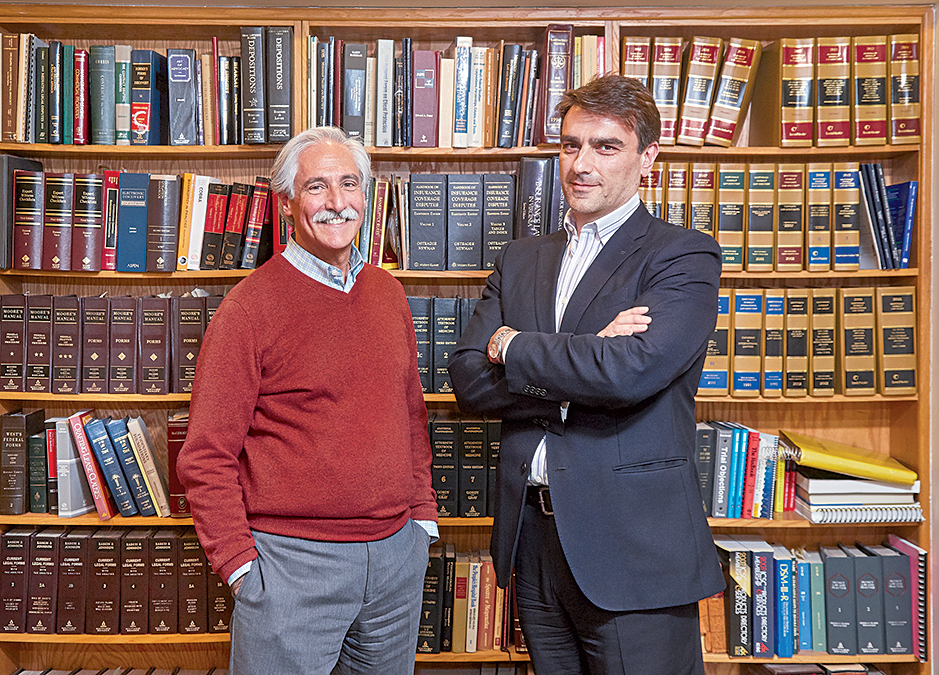
Passed in 1976, the Foreign Sovereign Immunities Act, or FSIA, protects foreign governments from being sued in US courts, unless the court finds that the case fits into one of seven exceptions from the law. Perles specializes in exploiting those exceptions. In 1996, he lobbied the Senate to approve a bill denying immunity to state sponsors of terrorism. After the bill passed, Perles represented the family of Alisa Flatow, an American student who had died in a bus bombing in Jerusalem, and won a $248-million judgment from Iran. He has collected some of the funds and is still seeking the rest.
A decade later, Perles helped wring $1.5 billion from Libya in damages for a dozen acts of terrorism committed in the mid-1980s. Overall, he says he has moved more than $3 billion from designated state sponsors of terrorism to American victims.
Working with Bregman and Akaras, Perles is preparing to file suit for hundreds of millions in damages from the Republic of Turkey. “Any foreign head of state who unleashes his security force against US citizens exercising their lawful rights on US soil has no protection under FSIA,” Perles says.
Other lawyers agree. A team headed by Agnieszka Fryszman of Cohen Milstein filed a victim-impact statement representing 13 victims of the Sheridan Circle attack, including Murat Yasa and Heewa Arya. The legal team has added Michael Tigar, who successfully sued the government of Chile for assassinating Orlando Letelier with a car bomb at Sheridan Circle in 1976. (His later cases include defending Terry Nichols in the 1995 Oklahoma City bombing trial.)
Tigar says students at American University law school are putting together the case against Turkey. He’s confident in its strength. “It took 16 years, but we got to get $4 million from Chile,” he says.
Bregman, on the other hand, acknowledges that the legal battle has its challenges: “Somebody needs to be punished. We are willing to put in the time and resources to push back against a fascist government so our clients are vindicated. It is well worth the effort.”
The only two men arrested for their role in the attacks, Sinan Narin and Eyup Yildirim, took pleas in exchange for light sentences and no fines. Still behind bars in DC Jail, they were visited by the Turkish foreign minister, who showed up in September.
“While visiting our brothers Sinan and Eyup Yildirim who continue to be tried in Washington,” the minister tweeted, “we transferred to them our nation’s love and greetings.” In Turkey, the two were heroes, if not martyrs.
Lucy Usoyan and Murat Yasa tried to make every hearing at DC Superior Court so they could lay eyes on their attackers. “I couldn’t believe how pleased they seemed to be with themselves,” Yasa says.
Mark Schamel, Yildirim’s defense attorney, describes him as a gentle, hard-working contractor who felt threatened and kicked one person, one time. However, video clearly shows Yildirim rushing past police to get at protesters and repeatedly stomping on and kicking Lucy Usoyan. The men eventually cut deals with prosecutors, pleading guilty to one count of assault in exchange for dropping the hate-crime charges. They agreed to serve one year and pay no fines.
“Erdogan gets to go around telling everyone President Trump called to apologize for the arrests,” Usoyan says. “He should apologize for telling his thugs to kick me in the head.”
Last November, federal prosecutors dropped charges, without explanation, against four of Erdogan’s security detail. In February, the Justice Department dismissed charges against seven more agents, leaving four still to face charges. The announcement coincided with a meeting in Ankara between Erdogan and then–Secretary of State Rex Tillerson.
Neither the Justice Department nor the State Department will comment on why the charges were dropped. Erdogan has claimed that Trump actually called to say he “was sorry” for the indictment of the Turkish president’s security agents, which the White House denies.
“Still,” says Usoyan, “Erdogan gets to go around Turkey telling everyone President Trump called to apologize about the arrests. He should apologize for telling his thugs to kick me in the head.”
On April 5, both Usoyan and Yasa testified at the sentencing for Yildirim and Narin, trying to persuade Judge Marisa Demeo to reject the plea and order a stiffer sentence. The judge accepted the year and day in jail time for the defendants but characterized the violence as “horrific” and “so shocking and opposite our democratic values.”
“That’s hardly justice for what they did to us,” Usoyan says. “It’s a tap on the wrist.”
Regardless of the legal outcome, their struggle continues.
“Next time Erdogan shows up,” Yasa says, “I will be there. Count on it.”
Lucy Usoyan vows to be by his side.
Web fellow Helen Carefoot provided additional research. This article appeared in the May 2018 issue of Washingtonian.
